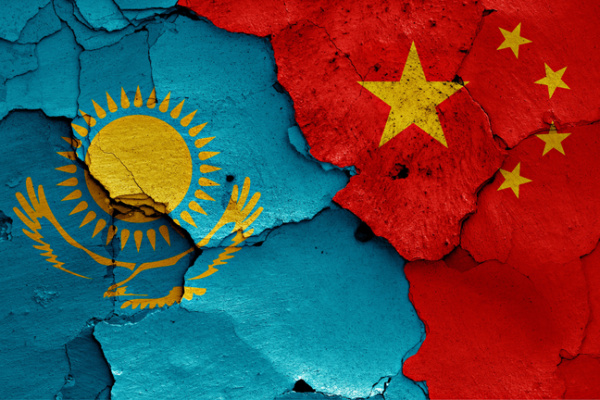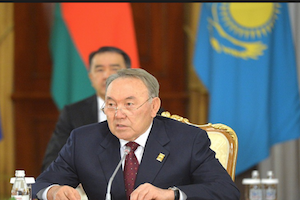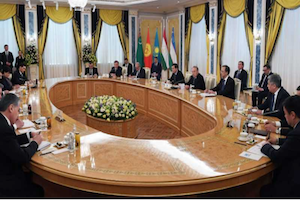Will the Shanghai Cooperation Organization Reconfigure Educational Cooperation?
WILL THE SHANGHAI COOPERATION ORGANIZATION RECONFIGURE REGIONAL EDUCATIONAL COOPERATION?
By Rafis Abazov
The recent Shanghai Cooperation Organization (SCO) summit in Astana has rekindled discussions on the role of the organization in reshaping regional educational cooperation. Historically known for its focus on security and economic issues, the SCO is increasingly recognizing education as a cornerstone for sustainable development and regional stability. This shift is significant for member states—China, Russia, India, and several Central Asian countries—as they navigate the complexities of globalization and seek to bolster their human capital. The main question is whether declarations at the summit denote a shift in the regional educational architecture.
BACKGROUND: Since its inception in 2001, the SCO has primarily concentrated on security cooperation and economic integration among its member states. However, the need for a skilled workforce, capable of driving innovation and economic growth, has brought education into the spotlight. The Astana SCO-2024 Summit underscored this shift, highlighting the potential of educational cooperation to foster mutual understanding, enhance economic ties, and promote cultural exchanges. In recent years, the SCO has launched various educational initiatives. The establishment of the SCO University Network, the SCO Youth Council and regional scholarship themes led to a sharp increase in regional student mobility – for example China reached a milestone in 2022 by attracting one million foreign students, while Kazakhstan attracted almost 30,000. Indeed, these efforts facilitated academic exchanges, joint research projects, and cultural interactions among students and scholars from member countries. The Astana summit built on these foundations, proposing a more structured and collaborative approach to educational cooperation, as almost one quarter of the 31 agreements signed during the summit were dedicated to the area of science and education. On top of this, Kazakhstan’s Ministry of Science and Higher Education hosted the regional conference “Cooperation in the field of higher education and production integration,” focused on developing a unified approach to accreditation, curriculum design, quality assurance, student mobility and mutual recognition of qualifications.
IMPLICATIONS: One of the important areas discussed at the Astana summit was the enhancement of academic exchanges and research collaborations. By fostering partnerships between universities and research institutions across member states, the SCO aims to create a robust network of knowledge and innovation. Such collaborations can lead to significant breakthroughs in various fields, from science and IT technology to social sciences and smart agriculture.
The proposed initiatives include exchange programs for students and faculty, joint research projects, and the creation of cross-border academic networks and joint research labs to study the impact of climate change at the regional and sub-regional levels. These efforts are expected to enhance the quality of education and research in member states, making them more competitive on the global stage. Another critical focus is the harmonization of educational standards across SCO countries. This alignment would not only enhance educational opportunities but also support a more integrated approach to developing double diploma programs between universities.
The summit proposed the creation of a common framework for higher education within the SCO. This framework would include standardized guidelines for curriculum development, accreditation processes, and quality assurance mechanisms. Such harmonization can make it easier for students to transfer credits between institutions in different countries and for professionals to have their qualifications recognized across the region. The COVID-19 pandemic has underscored the importance of digital education and technological integration.
The SCO members acknowledged that there is a rapid shift towards online learning, and an urgent need to invest in digital infrastructure and resources. The Astana summit highlighted the potential for collaboration in developing e-learning platforms, distance education programs, and digital literacy initiatives. In this context, the leading Chinese universities (such as Chinese Agriculture University) took initiatives to exploring ways of leveraging technology to bridge the digital divide among member states by promoting access to quality education and facilitating lifelong learning and upskilling, essential for adapting to the rapidly changing job market.
The creation of cohesive and inclusive frameworks would help to upscale the internationalization of education by integrating educational systems, and organizational cultures across SCO member states, and developing joint digital infrastructure. However, these initiatives require significant investments. Indeed, economic disparities among member states pose significant challenges. While some countries have advanced educational and digital infrastructures, others may struggle with limited resources and capacity. At least three countries – China, Kazakhstan and Uzbekistan – have allocated significant resources for bridging this gap, supporting deeper educational collaboration, and accelerating the adoption of online learning, access to digital tools and other resources.
CONCLUSION: The Astana summit SCO-2024 has set the stage for the SCO to play a transformative role in regional educational cooperation. As member states work to align their educational systems and policies, the organization is poised to reshape the regional educational architecture significantly. With a focus on academic collaboration, standardization, and digital innovation, the SCO is on a path to create a more integrated and dynamic educational ecosystem.
The success of future initiatives will depend on building on the foundations laid by existing programs. Strengthening and expanding platforms like the SCO University Network, the SCO Youth Council and numerous educational consortiums can provide a solid base for more ambitious projects. These platforms can serve as hubs for collaboration, innovation, and cultural exchange. Effective implementation requires the active engagement of various stakeholders, including governments, educational institutions, the private sector, and civil society. Collaborative efforts and partnerships can ensure that initiatives are well-designed, adequately funded, and effectively implemented.
The SCO has the potential to reconfigure regional educational architecture by enhancing educational cooperation and recognizing education as a cornerstone for regional development and peaceful integration. The outcomes of the Astana meeting signal a promising future for educational collaboration in the SCO region, with the potential to yield significant economic, social, and cultural benefits. As the SCO continues to evolve, its focus on education can play a transformative role in shaping the region’s future. By fostering a more interconnected and innovative educational landscape, the SCO can contribute to a more prosperous, stable, and cohesive region.
The Astana summit has marked a new chapter in this journey, setting the stage for the SCO to reconfigure the regional educational architecture in meaningful and impactful ways. Joint research projects and academic exchanges can generate new ideas, technologies, and solutions to common problems. This, in turn, can drive economic growth and increase competitiveness, positioning the SCO region as a leader in various fields.
AUTHOR’S BIOS: Rafis Abazov, PhD, is a director of the Institute for Green and Sustainable Development at Kazakh National Agrarian Research University. He is author of The Culture and Customs of the Central Asian Republics (2007), The Stories of the Great Steppe (2013) and some others. He has been an executive manager for the Global Hub of the United Nations Academic Impact (UNAI) on Sustainability in Kazakhstan since 2014 and participated at the International Model UN New Silk Way conference in Afghanistan.
China Backs Kazakhstan Against Russian Threats
By Natalia Konarzewska
January 12, 2023
During his visit to Kazakhstan on September 14, China’s President Xi Jinping asserted that China supports Kazakhstan’s territorial integrity and independence, and opposes any interference in Kazakhstan’s internal affairs. Xi's remarks sounded like a thinly veiled warning to Russia. Moscow has ramped up its aggressive rhetoric against Astana over its refusal to support Russia’s military invasion of Ukraine, which Kazakhstan has interpreted as a possible Russian threat to its territorial integrity. China’s explicit support for Kazakhstan should also be considered against the backdrop of Russia’s recent military defeats in Ukraine, which have exposed multiple military weaknesses.

The Perspective of Trans-Caspian Gas Flow to Europe
By Ilgar Gurbanov
October 25, 2018, the CACI Analyst
On August 12, Azerbaijan, Kazakhstan, Russia, Iran, and Turkmenistan signed the Convention on the Caspian Sea’s Legal Status in Astana. The Convention’s provision endorsing the construction of a subsea pipeline raised optimism regarding the Trans-Caspian Gas Pipeline (TCGP) project, which has been stalled due to the Caspian’s uncertain status. Discussions on the TCGP have been ongoing since the 1990s, envisaging the export of 30 billion cubic meters/year (bcm/y) of Turkmen gas to Europe across the Caspian by integrating with the Southern Gas Corridor (SGC).

Project "ASTANA": Signs of Demographic Upheaval?
By Rafis Abazov
July 10, 2018, the CACI Analyst
On the eve of the 20th anniversary of moving Kazakhstan’s capital from Almaty to Astana, the country’s government announced that the city of Astana has welcomed its one-millionth resident. Indeed, this was a remarkable achievement for the city, which within just 20 years – between 1997 and 2018 – grew from a population of only 290,000 to more than 1.1 million inhabitants, or more than 300 percent. Kazakhstan’s President Nursultan Nazarbayev envisions that the population of Astana could exceed three million by 2050. Therefore, the main question is whether Kazakhstan can sustain this rapid urbanization shift without facing major social and demographic upheaval.

Central Asia After Astana: From Integration to Cooperation
By Slavomír Horák
April 30, 2018, the CACI Analyst
After the March 15 meeting of Central Asian leaders in Astana, analyses, news and reports increasingly use words such as “integration” or “new beginning” to describe political developments in Central Asia. Some Russian media have speculated in the beginning of the next phase of separation from Moscow. However, the “consultative meeting” in Astana should be understood in a completely different manner. The word “integration” reminds us of previous, less successful attempts at regional cooperation in Central Eurasia and so far, no comprehensive integrational concept has materialized. Yet, the Astana meeting was the first of its kind in many years and President Nazarbaev, summing up the results, underlined its informal character and even compared the format to the Visegrad group in Central Europe.



